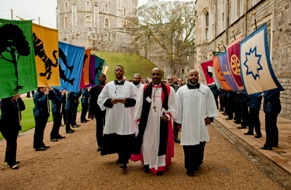Copenhagen: ARC Statement of Faith
December 2, 2009:
 |
 |
 |
Faith delegates process towards Windsor Castle. |
The eyes of the world are on Copenhagen this month as representatives of the world’s governments gather to negotiate a new climate treaty. The urgency of a comprehensive, fair and effective treaty to protect the living planet has never been greater.
Alongside the inter-governmental process, which may or may not achieve an agreement at Copenhagen, the civil society movement to protect the natural environment has a new and, for some, surprising champion – the religions.
Key traditions within nine of the world’s major faiths, which together reach out to 85 per cent of the world’s population, have created their own ‘climate treaty’, which they presented in the shape of long-term action plans on the environment to UN Secretary-General Ban Ki-moon in Windsor, UK, five weeks before Copenhagen. The faiths are: Baha’ism, Buddhism, Christianity, Daoism, Hinduism, Islam, Judaism, Shintoism and Sikhism.
Speaking at the Windsor event, Mr Ban highlighted the faiths’ key role in mobilising communities for change. “The world's faith communities are among the oldest and most enduring of institutions,” he said. “Through your commitments, we see how the world's faith and religious communities are responding to the need for urgent climate action. You can – and do – inspire people to change.”
UN Assistant Secretary-General Olav Kjørven said the world’s faiths - joined together - could become the planet's largest civil society movement for change: “With their unparalleled presence throughout the world, the world's religions could be the decisive force that helps tip the scales in favour of a world of climate safety and justice for future generations.”
Given that the faiths reach out to 85 per cent of the world’s population, it is likely that many government representatives at Copenhagen will be members of a faith. On behalf of those religions, ARC asks those individuals to reflect on what their faith is saying and doing on this crucial issue. And we invite the governments to join the world’s faiths on the journey they have begun towards a more sustainable and just future. Commitments include:
Mobilising for change
• The faiths agree that caring for the environment is a moral issue – with all this implies for how individuals lead their lives, how governments make decisions and how the faiths manage their own affairs.
• Faiths are launching extensive education programmes in schools (together they are involved in half of all schools worldwide) and in their teachings to promote environmental issues and bring about long-term lifestyle change;
• The Hindu, Muslim and Sikh communities are developing faith-based eco-labelling schemes for goods and services to help their members make environmentally friendly choices.
Reducing greenhouse gas emissions/promoting energy efficiency
• The religious buildings of major faiths – from churches, temples and mosques to schools, retreat centres and community halls – are set to be greened, with new standards being developed for waste, water and energy.
• The Church of England has pledged to cut its carbon footprint by 42 per cent by 2020 and 80 per cent by 2050 – more ambitious than the majority of targets at Copenhagen.
• Madinah in Saudi Arabia (Islam’s second holiest city) is set to become the first of 10 Muslim model green cities and commitments have been made to green the Hajj (attended by 2.5 million pilgrims each year) within three years.
• The Daoists intend to make all their temples in China solar powered and are establishing a series of eco temples as centres of inspiration and training.
• The Muslim Association for Climate Change Action is being established in January next year, with far reaching plans to make Muslim institutions and lifestyles more eco-friendly.
• The Church of South India is asking its members to adopt environmental tithing – cutting their carbon footprint by 10 per cent with the resulting financial savings going to green projects.
• The Shanghai Buddhists are setting up environmental offices in each major temple.
Sustainable forests
• The Evangelical Lutheran Church of Tanzania is to plant 8.5 million trees in community forests over the next seven years.
• Many other churches have extensive tree-planting programmes, including the Presbyterian Church in Cameroon, the Armenian Apostolic Orthodox Church, the Church of South India, the Evangelical Presbyterian Church of Ghana, and the Orthodox Church of Poland.
• The Shinto of Japan are heading a programme to develop an international Religious Forestry Standard (the faiths manage five per cent of commercial forests worldwide).
• Commitments have been made to print sacred books on environmentally friendly paper; currently 75 million Bibles and 15 million Qur’ans are produced annually.
Adaption/Justice
• The Church of England has launched the Climate Justice Fund to compensate communities overseas suffering most from the impacts of climate change;
• American churches are setting up eco-twinning projects with churches in the global south;
• The Patriarchate of Alexandria and All Africa is lobbying to end the dumping of industrial waste in Africa: “No waste should be dumped in any country unless the country of origin would allow it to be dumped on its own soil.”
• American evangelicals – 28 per cent of the US population – are integrating concern for ‘creation care’ with other justice issues.
|

